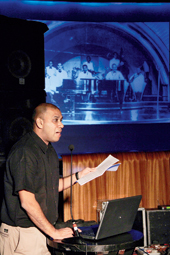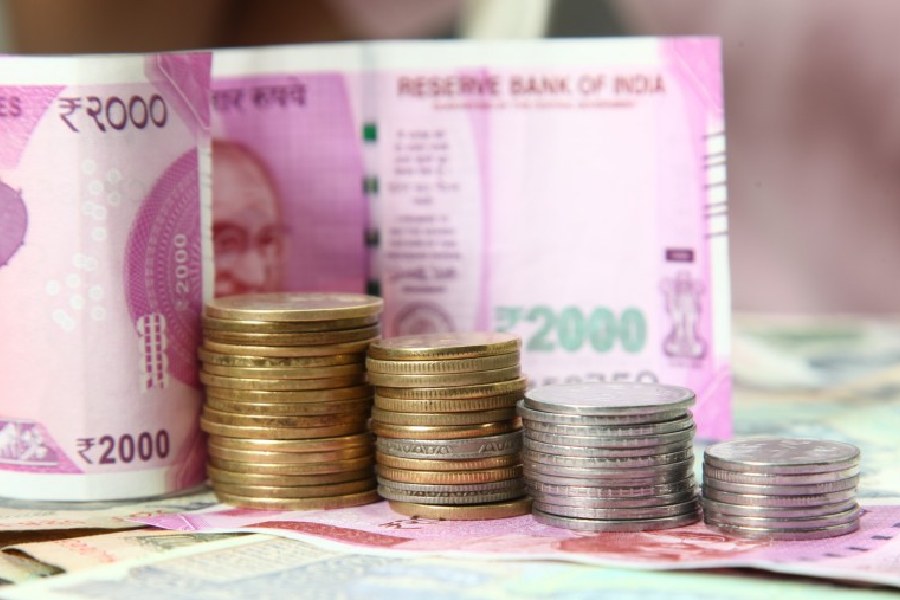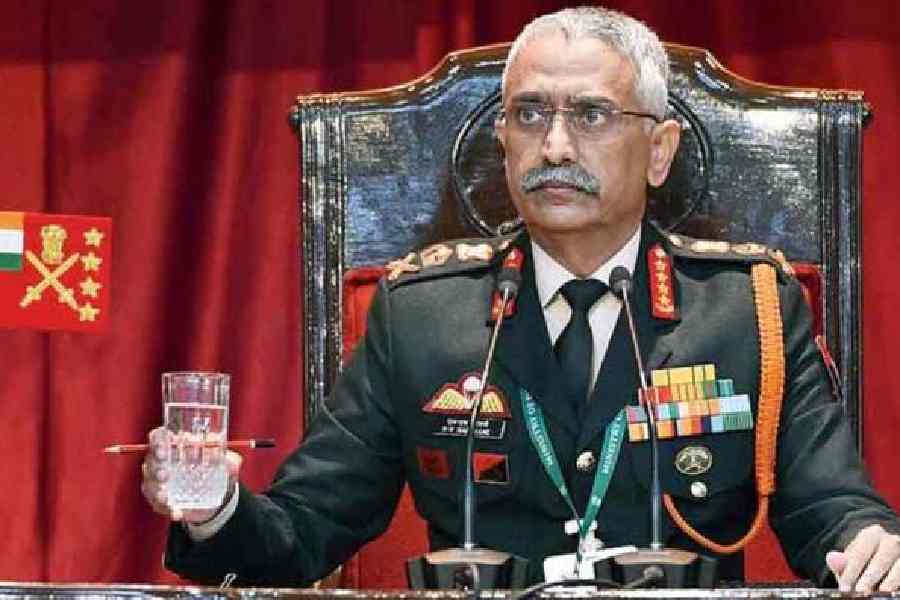 |
| Naresh Fernandes reads excerpts from his book, The Taj Mahal Foxtrot, at Roxy. (Bhubaneswarananda Halder) |
If once Calcutta had a claim to being called the jazz capital of India, Naresh Fernandes began by saying that his book challenged it. As the cold kept the rest of Calcutta shivering on Saturday evening, a small group of people at Roxy in Park Hotel found themselves enveloped in warmth and jollity as Fernandes launched his book The Taj Mahal Foxtrot, published by Roli Books. The launch was part of the ongoing Apeejay Kolkata Literary Festival.
The book is the story of jazz’s journey through India, told jovially, robustly, passionately, in a way that reflected the personality of the author, not to mention the spirit of jazz. It sounded like a blast.
Fernandes, a writer and an editor, read from his book excerpts on the peripatetic jazz pianist Teddy Weatherford, a larger-than-life figure who had started his career in Chicago and had played with Louis Armstrong, but moved on to various Asian cities, such as Shanghai and Jakarta, and in the 1930s landed in Bombay, where he played in a band, where else, at the Taj Mahal Hotel.
The reading was accompanied by a well-produced audio-visual that contained rare footage of Weatherford and other musicians, shots of Bombay which more than a century ago, too, had a split personality — cars ran along bullock carts, and some wonderful music, and the beautiful people of yore.
During World War II, Weatherford was in Calcutta, where he had a band. He died in the city in 1945 at the age of 43. A crowd of 40,000 people had joined his funereal procession. Fernandes’ excerpts and comments threw light on a little-known aspect of India’s music: the presence of Black musicians in the country, their legacy (obvious in Bollywood and Eena meena deeka), and the fact that many of them felt more comfortable in India than in the US, where the colour of their skin was yet to be tolerated. Fernandes, who was in conversation with writers Amit Chaudhuri and Anjum Katyal, closed the reading with footage of the Taj Mahal Foxtrot being performed by Crickett Smith and his band.
 |
| Salima Hashmi with Naseeruddin Shah at the screening of Jago Hua Savera. |
Tale of two Pakistans
It was a proud moment for Salima Hashmi as she watched the special screening of the 1959 Pakistani film by Asejay Kardar, Jago Hua Savera at the Rabindranath Tagore Centre auditorium, ICCR, on January 12. Her father, the renowned Pakistani poet and painter Faiz Ahmed Faiz had written the dialogue and the songs of the film and had collaborated in writing the script with Manik Bandyopadhyay and Kardar. Talents from Bengal had also collaborated in the film. Jago Hua Savera at the auditorium was screened for the first time in India, as part of the Apeejay Kolkata Literary Festival, 2012.
“My father was always hopeful that the film would be screened in India. But that could not happen for many reasons. And then the reels were lost. Finally they could be traced back to the original distributors in London. Though the negatives are no longer there, the producer Nauman Taseer’s son bought back the original print and it was screened here,” she said. There are plans to screen the restored, digitised version soon.
The 87-minute black-and-white film — the first realistic film of Pakistan — is about a fisherman and his family as they try to collect money to buy a boat. They fail, but the film ends on an optimistic note. The music scored by Timir Baran, Rahat and Nauman Taseer adds to the poignancy. Jago Hua Savera was an avant-garde film. It was a gritty depiction of the predicament of an impoverished small fishing village. The dialogues were in Hindi and in Bengali.
“The actors were from East and West Pakistan. Keeping the audience in mind, my father mainly used many words that were common in Bangla and Urdu,” added Hashmi.
The screening marked the centenary celebrations of Faiz. It was attended by actors Naseeruddin Shah, Saoli Mitra and film critic Samik Bandopadhyay.
Saradindu fest
 |
| A scene from Shunya Shudhu Shunya Noi |
Anya theatre organised Natyaswapnakalpa, a year-end theatre bash, for the 11th year at the Academy of Fine Arts and Rabindra Sadan.
This time the focus was on writer Saradindu Bandyopadhyay (1899-1970). A poet who started as a lawyer, Saradindu quit the profession to write. By 1932 he had given Bengal its own Holmes in Byomkesh Bakshi. Saradindu wrote short stories, whodunnits, plays, songs, romantic and historical novels.
On December 31, Anya Theatre staged six short plays based on Saradindu’s stories.
Ujjwal Chattopadhyay wrote two of the plays staged — Shunya Shudhu Shunya Noi directed by Suman Mukhopadhyay and Kanu Kohe Rai by Debesh Chattopadhyay. While Kanu was a love story, Ujwal said Shunya presented quite a challenge because the hero Gourmohan Saha (played by Suman Nandi) was in love with a disembodied person. The other plays were based on the stories Ghori, Maru O Sangha, Oshoriri and Bahni Patanga.
(Contributed by Chandrima S. Bhattacharya, Chandreyee Ghose and Sebanti Sarkar)










